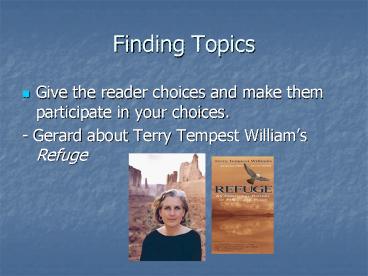Finding Topics PowerPoint PPT Presentation
1 / 30
Title: Finding Topics
1
Finding Topics
- Give the reader choices and make them participate
in your choices. - - Gerard about Terry Tempest Williams Refuge
2
Triangle
- Personal Essay
- Creative Non-Fiction
- Opinion Writing
3
Person versus Place
4
Pity me, not.
- Self pity, victimization and blame can repel
readers.
5
Curiosity
- Pay attention to what goes on around you.
- Understanding of things that are complex.
6
Concrete Detail
- How new lovers talk
- Coarse fabric of an old army jacket.
- Broken knees of an old friend.
- Smell the night breeze.
- Old woman in black shawl.
- Go off the tour.
- Do things in theyve never donein their own
backyard.
7
Two Subjects
- Apparent and deeper subjects.
- Unique parallels.
8
Good Subjects
- Good subjects arent just waiting around waiting
to be scooped up. The writer has to take raw
data and somehow refine it toward meaning.
Sometimes the interest is obvious, in a general
way other times it is not obvious, even to the
writer. - - Gerard on p. 17.
9
People
- One way or another, the focus of every really
good story is a person. - - Gerard on p. 17
10
The 3 Questions Transaction between writer and
reader
- Who is writing this?
- Why am I telling this story?
- Who will be reading this?
11
Who is writing this?
- Who am Iin life?
- Who am I when I tell this story?
- What do you believe in?
- What are you passionate about?
12
Who are You?
- Where is my passion?
- What keeps me awake at night?
- What are the rules of conduct I set for myself as
I make my way in the world? - What makes me angry or lifts my spirit?
- What am I willing to defend and how far will I go
to defend it? - What do I really believe in?
13
Your Ten Identities
- List ten different identities for yourself.
- Describe each identity.
- What moves you in those identities?
- What do you feel?
- What do you care about?
- What are the hidden motives in your own behavior?
- What are the key words?
14
Your Identities
- Your identities give you subjects for a personal
essay. - Character, not characters.
15
Subject
- Why are you telling this? Because it matters,
but how? - Passion is contagious and quirky.
- You dont always know where the essay is headed.
16
Imagination
- The way the imagination seems to work is that
you are constantly constructing analogies out of
something familiar to you. - - William Howarth
17
Finding a Subject
- Need to be open to new patterns.
- Comparisons.
- Metaphors.
- Careful observation.
- Inspiration and passion.
- Just sitting in the library.
- Looking at old photos.
18
The Common and the New
- Do you have a new approach for a common subject
or a completely new blend?
19
Promise to the Reader
- Dont write down to the reader.
- No ego tripdont show off.
- Lawrence Criner, Editor of
20
A New Place
- The writer must always take the subject beyond
the obvious, beyond the truisms and conventional
wisdom, into new territory. The reader
recognizes the subject. It is familiar,
comforting. But somehow it has been offered in
such a way that the reader would never have
thought of it without you, the writer. - - Criner
21
3 Kinds of Readers
- Never interested in what you have to say and will
disagree no matter what. - Knows what you have to say already and agrees.
- Neither agrees or disagrees and may not have
given the subject much thought.
22
Its Your Life
- You can write about what your experience means to
you. - Butfinding your true voice takes work.
23
Two-Way Mirror
- a two-way mirror, prompting a startling moment
wherein the writer and reader each recognize some
aspect of themselves in the other and come away
from the moment transformed. - - Joan Frank
24
Seeds
- Getting to the flower of true voice requires
work. Just as a seed cannot perform the miracle
of growing into a new plant until it is released
from what encloses it, often you must crack open
the experience of your life to find the true seed
from which to write. In doing so, you learn
something new about yourself and your
circumstances. - - Bender on p. 23
25
Universal Experience
- Get beyond mere recounting and find the wisdom.
26
I is Your Eye
- Use first person as much as you need to.
- You can pair down later if needed.
- Inside experience become the outer landscape.
27
Formal Affair
- Must understand structure
- Writing that moves along gracefully
- A bridge to your learning , insight and wisdom.
28
Modesty
- the essay is most profound when it is modest.
- - Joseph Epstein
29
More than Now
- Essay demands we see beyond the moment.
- Set the glow of one of lifes sparks.
- The struggle of staying in touch with life.
30
Compass
- Writing essays is a lot like hiking through a
wilderness. Just as a compass helps indicate
direction to travel and careful observation helps
you figure out a way there, your inner voice
aided by the response of listeners indicates the
path of your essay.

